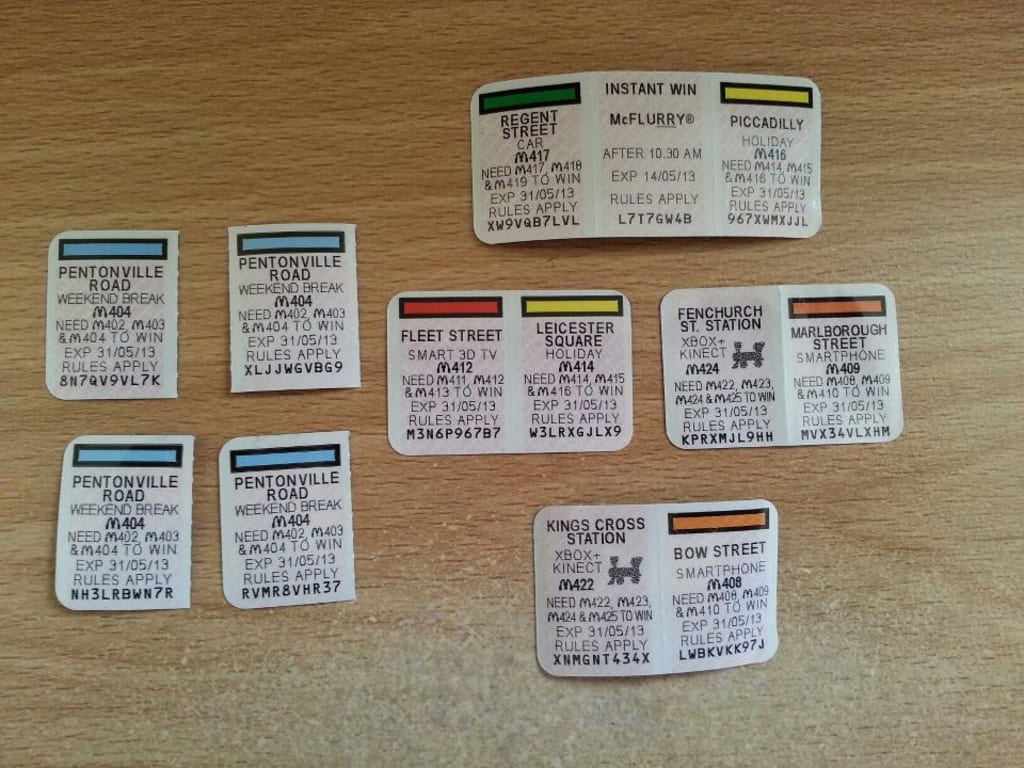The Forgotten McScam
McDonald’s beloved Monopoly promotion was at the center of a $24 million scam.

Do you want to be an instant winner? It’s hard to imagine anyone saying no to a question like that, especially when the prize money is a million dollars. There is a group of people who would argue that the consequences of them saying yes were not worth the amount of money that they “won.” Being ensnared in the forgotten McDonald’s scandal that nearly brought down the fast food giant in a public relations nightmare and found a once-thriving marketing firm closing its doors is not something anyone wants to be remembered for.
The mastermind of the Monopoly conspiracy was one Jerome Paul Jacobson. At one point in his life, he had aspired to be a police officer, but physical ailments had made that dream nearly impossible. His now ex-wife helped him land a job in 1981 that would change the course of his and many other people’s lives. After their divorce, Jacobson started doing private security for Dittler Brothers, the company that his ex helped him get into and caught the attention of Dittler Brothers client, Simon Marketing.
Simon Marketing had a huge client, McDonald’s, and they were gearing up for the annual Monopoly promotion. The odds of someone winning the bigger prizes ($1 million in cash, a car, etc.) were very slim. So slim, in fact, it’s a miracle that the scam went on for as long as it did. Jacobson was so good at his job that people overlooked specific issues that would be deemed offensive today. A former colleague says “He inspected workers’ shoes to check they weren’t stealing McDonald’s game pieces.” Another former coworker revealed, “I couldn’t even go to the bathroom without someone going with me.” Jacobson was so concerned about the integrity of the promotion he would watch people pee. Why would he do that? Jacobson told investigators, “It was my responsibility to keep the integrity of the game and get those winners to the public,” until he didn’t do that.
It all began when a psychic allegedly told Jacobson that he was going to be wealthy soon if he invested his money. A former co-worker recalls, “A psychic had told him to invest money, and he would be richly rewarded.” Instead of taking his own money, Jacobson took a winning Monopoly piece that he was in charge of and snuck it to his stepbrother, Marvin Braun. Jacobson confessed that he has no idea why he brought his family into the scam. “I don’t know if I just wanted to show him I could do something, or bragging,” or maybe he wanted to kick off his scam.
Shortly after the incident with his stepbrother, Jacobson began talking to his butcher. The Butcher commented about wanting to win a prize from the Monopoly game, and Jacobson insisted that he could make it happen. This was the first time that Jacobson took money for giving away a prize card. He was paid $1,000 for a $10,000 winning ticket. It set the scheme into motion and would soon ensnare the mob into it.
After several years of not being in charge of distribution of the game pieces, 1995 brought back that part of Jacobson’s job. Now the pieces were being put on fries containers and cups. Not a big deal, but Jacobson claims what he saw happen next was what made him ramp up his scheme. Allegedly, executives from Simon Marketing re-ran a computerized program that had selected an area in Canada as the winner of a major prize. He alleges that they ran the program until it picked an area within the United States. This incident is what spurred Jacobson to take his scheme to the next level.
After a roll of anti-tamper stickers was accidentally sent to him, Jacobson began to put his plan into place. “I would go into the men’s room of the airport; I would go into a stall. I would take the seal off.” The men’s room was the only place the female auditor following him could not go. Swiftly he would change the instant winning tickets with “common” tickets. As a way to protect himself against possible prosecution, Jacobson not only stole a million dollar instant winning ticket but also evidence of his bosses changing the outcome of the computerized output for the winners. After that, he stole another million dollar instant winning piece.
Instead of using it for personal gain, though, Jacobson sent it to an organization that needed the money, The St. Jude’s Research Hospital in Tennessee. One of the donation clerks was opening mail and figured that the envelope she opened was junk mail. That is until she saw the game piece. It was a mass celebration, but nobody knew who the generous benefactor was until it was uncovered by the FBI years later. Jacobson was ready to take the scheme out for another spin.
His old buddy The Butcher wanted another win and suggested that he would go to Maryland with his sister and have her claim the prize money. Jacobson and The Butcher agreed on a $200,000 winning ticket and Jacobson’s fee of $45,000. “I figured I could trust him because he paid me the first time,” Jacobson complained. However, he was shocked to see his good friend The Butcher accepting the prize money himself and refusing to pay the fee. It was presumably the last time the men did business with one another.
Shortly after that 1995 incident, Jacobson was sitting in an Atlanta airport. This is where he met Gennaro Colombo, head of the Colombo crime family. This fateful meeting brought the mob into the swindling scheme and set it on course for a major reinvention. After both shared where they were headed, Atlantic City, they talked about careers. Colombo owned adult nightclubs, underground casinos, and a sports betting ring. Jacobson touted that he was in gambling too, albeit for the Monopoly contest McDonald’s was hosting. This piqued Colombo’s interest.
In November 1995, Jacobson gave Colombo a winning piece; the prize was a Dodge Viper. Colombo harbored a secret desire to be an actor and jumped at the chance to appear in a commercial touting his big win. However, since as his widow put it, he was a “big guy,” he took the cash value of the car instead. Things were starting to turn out the way Jacobson had wanted them to.
Robin Colombo married her husband after a two-week courtship. In 1996, her family started benefiting from the partnership of Gennaro and Jacobson. Her father was a recipient of a $1 million instant winner ticket. Within the family, Jacobson was known as “Uncle Jerry.” Everyone was happy and making money.
One of the people that made money from this enterprise was Gloria Brown, a friend of Robin. Colombo offered her a million dollar ticket, in exchange for $40,000 up front. It felt off to Brown, but she went through with it, including using a cousin's address in South Carolina because there had been too many winners in Jacksonville.
Jacobson, meanwhile, was still giving his stepbrother winning pieces and what not. Braun, for his part, denies cashing any of the pieces in for money, instead saying he was giving them away to charity because he has a successful chain of clothing stores. Mark Schwartz, Jacobson’s nephew, got into the game (no pun intended). He asked for a $200,000 piece and in return gave Jacobson $45,000. There was no slowing down this fast-moving money train.
By 1998, Jacobson was rolling in his ill-gotten gains. He was dressing in elegant suits, going on expensive vacations, and joining exclusive clubs. He would buy expensive cars the way some buy a soda.
His friends and partners in crime were not doing as well. Robin and Gennaro Colombo were having some marital issues. They had decided to relocate from South Carolina to Georgia after the birth of their son. Alas, on the way to see a house, a tragic car accident killed Gennaro Colombo. It was ironic that the man who had “won” a car from McDonald's would be killed in a car wreck that would send his immediate family to the hospital as well.
Soon after the death of his partner, Jacobson was looking for someone else to help fill the void. While on a cruise, he found the perfect partner, Don Hart. Jacobson told his new friend all about the scheme that he was carrying on, but Hart had doubts. So he had an acquaintance cash in a piece for $200,000. After that, he no longer had concerns but wanted to keep his hands clean. “After that, Mr. Hart told me he didn’t want to be involved in handling any game piece tickets or handling any money,” But he knew people who would recruit others into the Ponzi scheme and keep the cash flowing like a river.
That river was about to endure some choppy waters though. Hart introduced Jacobson to the man that would eventually bring the whole scheme crashing down around them, Andrew Glomb. There was already some notoriety around Glomb as he had been prosecuted for transporting cocaine on a PanAm flight. Glomb was still friends with his drug dealing and taking cronies and decided to give them a few of the tickets because it made him feel like a superior being. In his own words, “Because I like you, I can make you a millionaire.” Glomb went to Pennsylvania to see his cousin, who wanted to win one of the prizes that McDonald’s was giving away. Glomb advised, “You know, don’t waste your time.”
The same advice could have been given to Jacobson, who felt the walls closing in on him because the “winners” he created were appearing on commercials and were all over TV.
Indeed, the FBI was closing in on the scheme. Special Agent Richard Dent had received an anonymous tip in March of 2000 that the winner was a fraud. Dent called Amy Murray, a McDonald’s spokeswoman, with the news. With a reputation as someone who quick on her feet, Murray suggested staging a press conference in the home of William Fisher. An agreement between Murray and Dent was made, and the McSting was on.
This was unknown to Jacobson at the time, and he was busy roping in another person. He was talking with his friend Dwight Baker. The men should’ve been concerned about Operation: Final Answer being underway. Since they didn’t know, the plan was to keep enriching themselves. Baker was ambitious and had plans to be wealthy, own his own golf course. That plan fell through when he failed to get investors lined up.
Just before the meeting with Jacobson, Baker had suffered a nasty accident when the brakes on his tractor failed to stop and he ended up with a spine injury. His companies owed back taxes, and the IRS had started selling off parcels of his land as payment. His family had been chasing the McDonald's Monopoly dream for more than 15 years at that point. Jacobson asked, “If I were able get a game piece, do you know someone who you trust that would cash it?”
Baker was hesitant but eventually said yes. Jacobson demanded $100,000 and that whoever claimed the prize say they pulled the winning ticket from a hash brown. That didn’t happen. Baker showed the winning piece to a young ward by the name of George Chandler. The instructions were simple: don’t take part in any promotions. Too late, Chandler was already scheduled to appear for a press conference and party. Baker was angry. He hissed to Chandler, “There’s more to this than you know.”
There was more to it than any of the men knew because the footage found its way to the FBI and Dent. By 2001, the investigation was being ramped up. Baker gave winning pieces to his Sister-in-law and Ronnie Hughey, a friend. Murray asked Hughey to appear in a commercial, but he declined to say that he suffered from depression. However, FBI agents had discovered that he lived right near Chandler, the last winner.
Brenda Phenis, the sister-in-law of Baker, was a tad more clever about her winnings. She rented an apartment in North Carolina and got a state ID to avoid suspicion. A quick credit check, though, showed that she was from South Carolina and lived in what was dubbed the Golden Triangle, with Jacobson’s lake house in the center.
McDonald’s was prepared to send out the winning checks, but Dent asked them to delay the payment while he applied for wiretaps. That delay was “fruitful” according to the Special Agent because everyone was freaking out. Jacobson wanted Phenis and Baker to make a big deal out of the delay, to say… "Do we need an attorney or do I need to call the home office?" or "Do I need to call Burger King?” Though in hindsight, Jacobson says that he had “a feeling” that law enforcement was on to them.
Baker was convinced that his sister-in-law was going to double cross them. The paranoia got to the point where he demanded that she give him all the money or he would claim that she robbed him. When he went to the fake apartment and found no mail there, it sent him into a spiral.
A complication arose in the investigation. McDonald’s was readying for a second give away but had thought about calling it off because of the scam. Despite the potential consequences, the CEO agreed to let the game go on and Dent to finish gathering the evidence that he needed to bring this to an end. With a big promotional push in July of 2001, the game went on and so did the investigation.
In this promotion, there were only two pieces that would make someone an instant millionaire, and both were in the pocket of Jacobson. Baker wanted them, but his friend was demanding a deposit this time. Moreover, he still hadn’t received money from his sister-in-law.
For her part, Phenis had gone to collect her prize from Simon Marketing. When she flew into Indianapolis International Airport, she was accosted by her family. She had $20,000 in cash and a cashier check for $480,000. They were not pleased with these results. The ensuing confrontation was caught on camera by FBI agents.
Also caught by FBI agents was the next phase of the plan. Baker handed Jacobson $70,000 in cash, stuffed into a McDonald’s paper bag. After Baker got the winning ticket, he took it to his friend Hughey, who would give it to a man by the name of John Davis, a Texas resident. This time, the FBI was ahead of them.
Amy Murray called Dent to let him know about the latest winner, but he already knew. They dreamed a way to bring all the winners together, to arrest them all. However, the idea was shot down.
Instead, the FBI agents fanned out and arrested the winners, including the last one, Michael Hoover. He was brought into the scheme by Glomber, and only had a few minutes to enjoy his winnings before being arrested. Attorney General John Ashcroft said, “Those involved in this type of corruption will find out that breaking the law is no game.” Jacobson, though, still thought he had his ace to play.
Remember he figured that his bosses making sure that the winners were in the U.S. would ensure that he wouldn’t be fired or prosecuted for his crimes. That is, until he saw his scheme laid out for him, while the FBI questioned him.
Everyone was prosecuted, though Chandler had his conviction overturned because his attorney successfully argued that Baker duped him. Glomb has a great outlook on the whole situation.
“I’m not one of those people who are mad at [the FBI]. It was a game, and I lost.”
About the Creator
Edward Anderson
Edward has written hundreds of acclaimed true crime articles and has won numerous awards for his short stories.






Comments
There are no comments for this story
Be the first to respond and start the conversation.